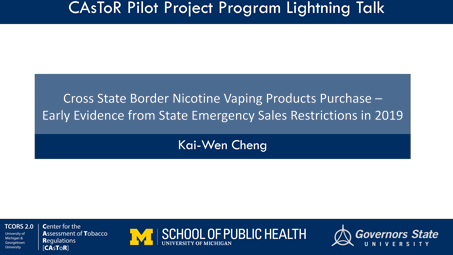“Cross State Border Nicotine Vaping Products Purchase – Early Evidence from State Emergency Sales Restrictions in 2019” with Dr. Kai-Wen Cheng (Governors State University)
- Contact the presenter
- Dr. Kai-Wen Cheng <kcheng@govst.edu>
- View Abstract +
- INTRODUCTION AND AIMS: Flavors in tobacco products have particularly strong appeal to youth and young adults. The FDA has considered banning flavors in non-cigarette tobacco products and menthol in cigarettes. This pilot grant focused on the period where several states implemented an emergency policy and prohibited flavored or non-flavored NVP sales in response to the EVALI outbreak in 2019 in the states of Washington (WA), Rhode Island (RI), and Massachusetts (MA). I used 2019 Nielsen Scanner data from Kilts Marketing Data Center Archive of the Nielsen Company at the University of Chicago Booth School of Business. I investigated the impact of a state-level NVP characterizing flavor ban on sales of restricted flavored or non-flavored NVPs. Further, I investigated potential cross-border shopping to get around sales restrictions by investigating NVP sales from the borders of surrounding states where flavored NVP sales were allowed. I contributed to the current literature by identifying NVP sales displacement due to cross-border purchase and quantifying the share of NVP sales displacement from states where sales of NVP flavors or NVPs were prohibited to states where NVP flavors or NVPs were allowed. KEY FINDINGS: The findings indicated that flavored NVP sales declined significantly in WA, MA, and Rl after the implementation of non-flavored and/or flavored NVP sales restrictions in response to the EVALI outbreak in 2019. Potential displacements, such that individuals switched to non-restricted tobacco flavored NVPs and/or non-restricted retail channels, were identified. Findings indicated a significant increase in non-restricted tobacco flavored NVP sales after the flavor ban. Results also indicated that after WA imposed a flavor ban, weekly sales for the Washington-Oregon border area increased significantly by 69.4 (6%), 1169.7 (39%), and 2.4 (2%) (all p-values <0.01) for tobacco flavored, menthol/mint flavored, and other flavored NVPs, respectively, compared to sales in the non-border area. Similarly, after MA imposed an NVP sales ban, sales for the border areas in surrounding states, including New York, New Hampshire, Vermont, and Connecticut, increased significantly by 1637.16 (56%), 5196.78 (51%), and 276.74 (79%) (all p-values <0.01) for tobacco flavored, menthol/mint flavored, and other flavored NVPs, respectively, compared to sales for their non-border counterparts. Finally, after RI imposed its NVP flavor ban, sales from the border area in Connecticut increased significantly by 843.5 (47%), 1191.75 (16%), and 61.31 (18%) (all p-values <0.01) for tobacco flavored, menthol/mint flavored, and other flavored NVPs, respectively, compared to sales for their non-border counterparts. PUBLICATIONS: Dr. Cheng is the lead author of a manuscript resulting from her pilot project work. The paper, under preparation, is entitled “Cross State Border Nicotine Vaping Products Purchase – Early Evidence from State Emergency Sales Restrictions in 2019” with Alex Liber and David Levy.
- View Bio +
- Dr. Cheng is an Assistant Professor in the Department of Health Administration at the Governors State University. Her expertise and training are in health economics and policy analysis specifically within the tobacco control field. Her earlier research focused on analyzing the impacts of various tobacco control policies, including the impact of taxation/pricing and clean indoor air laws on cigarette smoking and related outcomes among various populations, including adults, adolescents, children, and pregnant women. Recently, she has been investigating the impacts of state and local level indoor vaping restrictions, sale restrictions on vaping products, as well as other potential FDA regulatory actions on the use of nicotine vaping products. Dr. Cheng serves as a co-investigator and collaborates with scholars on several grants sponsored by the National Institutes of Health and the Canadian Institute of Health Research. She has published articles in leading economics, public health, and tobacco control journals, e.g., Health Economics, American Journal of Preventive Medicine, Addiction, Tobacco Control, etc. Dr. Cheng has been conducting research in the economics of health behaviors for over 10 years and tobacco regulatory science research for over three years. Dr. Cheng actively participates and presents her research in scientific associations and conferences at the national level, including such venues as the American Society of Health Economists and the Society for Research on Nicotine and Tobacco. Dr. Cheng’s profile at Governors State University.
 Dr. Kai-Wen ChengGovernors State University
Dr. Kai-Wen ChengGovernors State University
